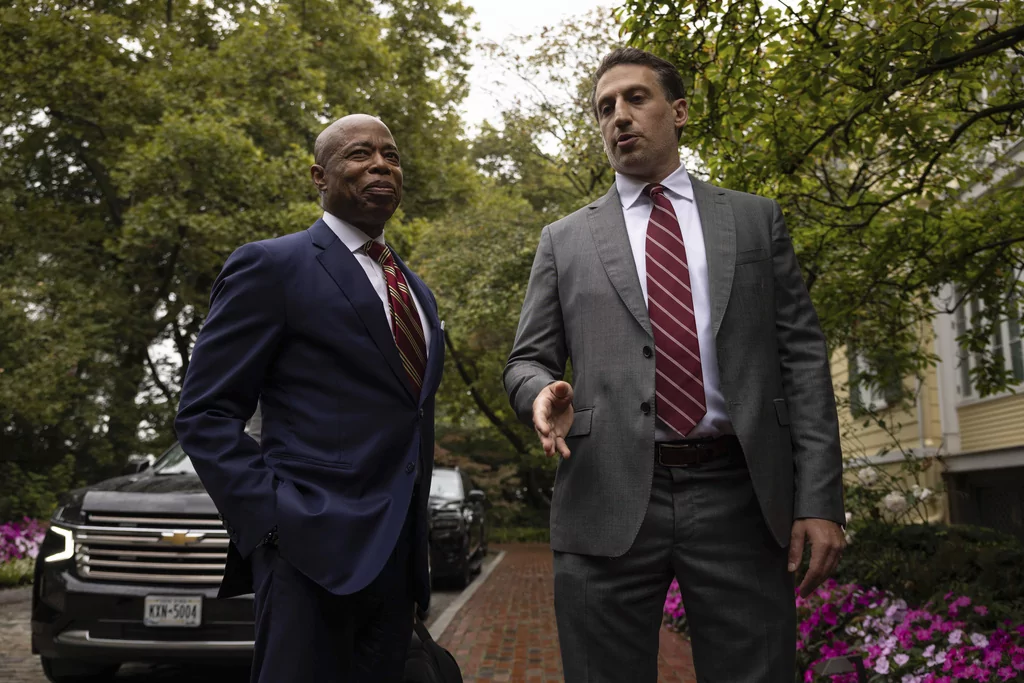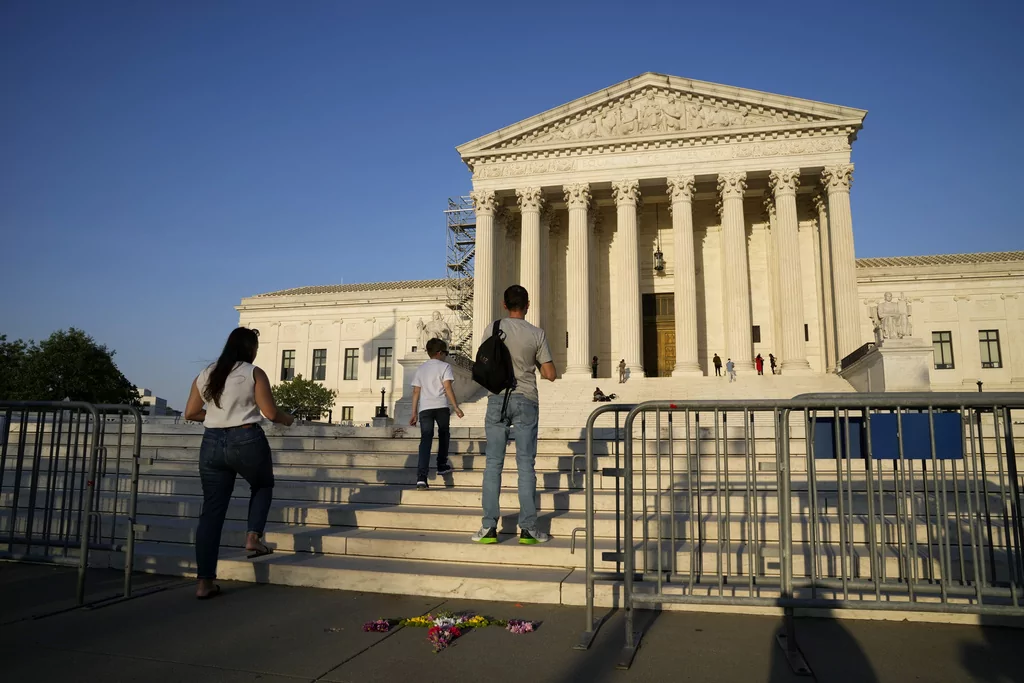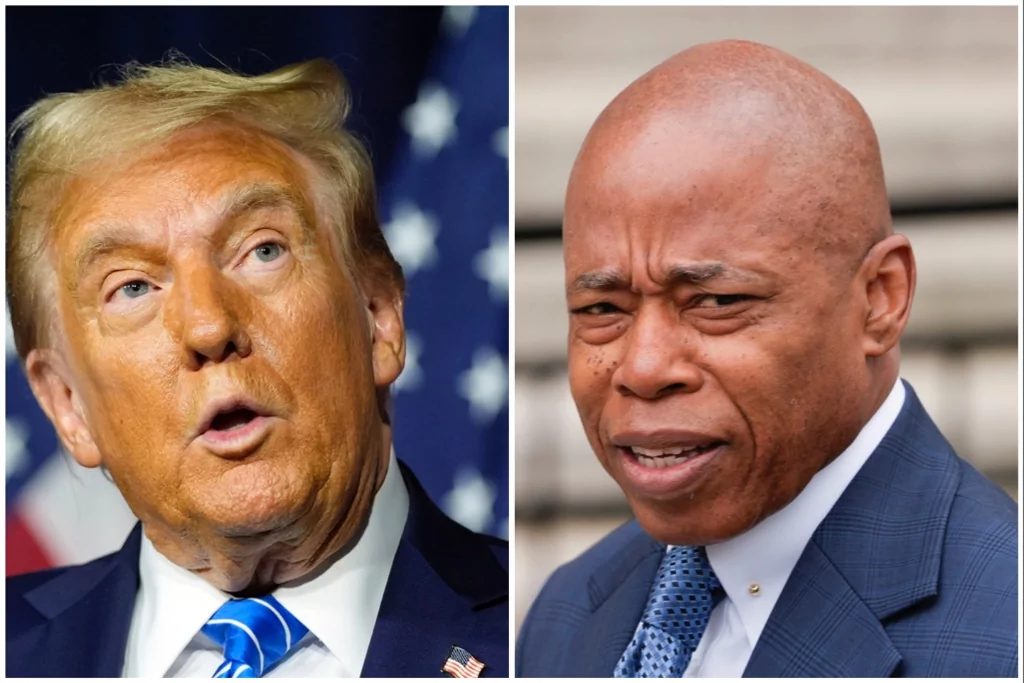
Former President Donald Trump and New York City Mayor Eric Adams, each facing serious criminal charges, share at least one commonality as they fight their cases in federal court.
Both politicians similarly stand to benefit from separate Supreme Court rulings from earlier this year, which defense lawyers have eagerly pointed to in recent court filings. Five charges were levied against Adams last week, including federal bribery and wire fraud counts stemming from alleged favors he gave to Turkish nationals, and Trump is fighting four criminal cases as he campaigns for the 2024 election.

Adams’s high-level attorneys relied on a case called Snyder v. United States in their bid to dismiss the federal bribery charge. In a 6-3 decision written by Justice Brett Kavanaugh, the high court found former Portage, Indiana, Mayor James Snyder was wrongfully convicted because he received a gift after, not before, carrying out an official government action.
“Just three months ago, the Supreme Court rebuked the Justice Department for adopting an ‘unfathomable’ interpretation of the federal-program bribery statute,” the Democratic mayor’s lawyers wrote in their trial court motion this week, citing the Snyder precedent.
Relatedly, a Supreme Court precedent that benefits Trump is the United States v. Donald Trump ruling from July 1, which saw the justices rule 6-3 to find that former presidents do enjoy some immunity from prosecution, although they allowed special counsel Jack Smith’s Jan. 6 case against him in Washington, D.C., to proceed.

What happened in the Supreme Court case?
The Snyder decision held that a federal law known as Section 666 prohibits bribing state and local officials, but does not make it a crime for those officials to accept gratuities for past acts. Prosecutors also must prove an “official act” took place in exchange for whatever the allegedly corrupt official was gaining.
Alex Spiro, one of Adams’s attorneys, argued that direct “quid pro quo” is necessary to bring a bribery charge, citing the Snyder case, and added that there was a “highly selective enforcement on display here.”
“In short, the bribery count in the indictment suffers from the same fundamental legal problems that have long plagued the Justice Department’s aggressive targeting of prominent public officials: a sweeping view of federal statutes that criminalizes routine conduct and replaces measured ethics rules with the blunt force of federal criminal law,” the mayor’s counsel wrote.
The Washington Examiner discussed Adams’s motion to dismiss the corruption charge with attorney Richard Kelsey, who previously covered the federal criminal case against former Virginia Gov. Bob McDonnell when he worked for NPR.
How does the Snyder case benefit Adams?
Proving that the bribery allegations against Adams pertained to any “official acts” under the color of his office would be the primary challenge for the prosecution because the Snyder decision narrowed the definition of that term, Kelsey explained.
“It’s one thing to assume that a politician did X because you did Y, but prosecutors are required to prove that X happened because of Y, and that’s where these prosecutions break down,” Kelsey said. “And I suspect that’s exactly where this prosecution is going to break down for Adams.”
Attorney Kyle Clark told the Washington Post that the Snyder decision is a boon for Adams’s defense team at the outset of this case, noting that “prior to Snyder, I don’t think they had a chance.”
For now, the government plans to bring “witnesses who will say they made illegal contributions to the campaign,” Assistant U.S. Attorney Hagan Scotten told U.S. District Judge Dale Ho on Wednesday.
Kelsey also pointed out the significance of the political timing behind the Adams indictment, noting that while the allegations are serious and the public is still digesting the claims, the Democratic mayor fell under federal investigation at a time when he criticized his own party’s immigration policies and the devastating impact they have on the Big Apple.
“I think the goal here on this prosecution is to put Adams under the flame so that, in a political process, be it a primary or something else, they get rid of a guy who is not toeing the line,” Kelsey said.

Adams and Trump vehemently say they’re not guilty
The mayor’s response to the case so far has in some ways mirrored Trump’s refrains since the Department of Justice launched a raid on his Mar-a-Lago property in August 2022, which preceded two federal cases against the former president, as well as a criminal case each in both New York and Georgia.
For Adams’s part, he has described himself as a “target,” while Trump calls his cases a “witch hunt” by the “weaponized” Biden DOJ. Adams told a magistrate judge last Friday that he is not guilty as he vows to remain mayor while fighting the charges.
The pair have even appeared to flirt with the notion of supporting one another while they face serious federal charges after Adams suggested he would “welcome” the support of Trump and Trump said he believed the Biden DOJ was targeting Adams.
Prosecutors still pushing the charges despite recent rulings
While the Supreme Court has issued rulings that may stand to benefit both politicians, prosecutors are also entitled to explain why they believe the charges can stand regardless of Supreme Court rulings that may narrow the application of a statute. Special counsel Smith, whose conviction of former Virginia Gov. McDonnell was infamously overturned at the Supreme Court, is doing that now in Trump’s Jan. 6 case.
On Wednesday, U.S. District Judge Tanya Chutkan allowed Smith’s recent 165-page motion to be unsealed. That filing sought to paint Trump as a mastermind behind a plan to sow doubt about the results of the 2020 election.
The filing also served in part as Smith’s response to the immunity decision, which held former presidents are not immune from actions undertaken in their private capacity. The decision could further benefit Trump down the line, as his attorneys have argued certain communications, such as those with former Vice President Mike Pence, should not be included in the indictment or brought up at trial due to the high court’s holding.
Smith wrote that Trump “extensively used private actors and his campaign infrastructure to attempt to overturn the election results and operated in a private capacity as a candidate for office.”
But for legal critics such as Kelsey, the move to release the sealed filing just over a month before Election Day was done “solely to manipulate votes.”
Kelsey said the Smith filing matters because it “permits a party to use nondeterminative allegations as a political weapon, and that’s a problem, right? As a political weapon in the last month of an election, nondeterminative allegations that are one-sided.”
CLICK HERE TO READ MORE FROM THE WASHINGTON EXAMINER
The mayor of New York City is also staring down similar interference threats for the next mayoral election in 2025.
For the same concerns outlined by Kelsey, Adams’s attorneys asked his judge this week for a trial by March, underscoring the need for speed as Adams plans to campaign for reelection.





